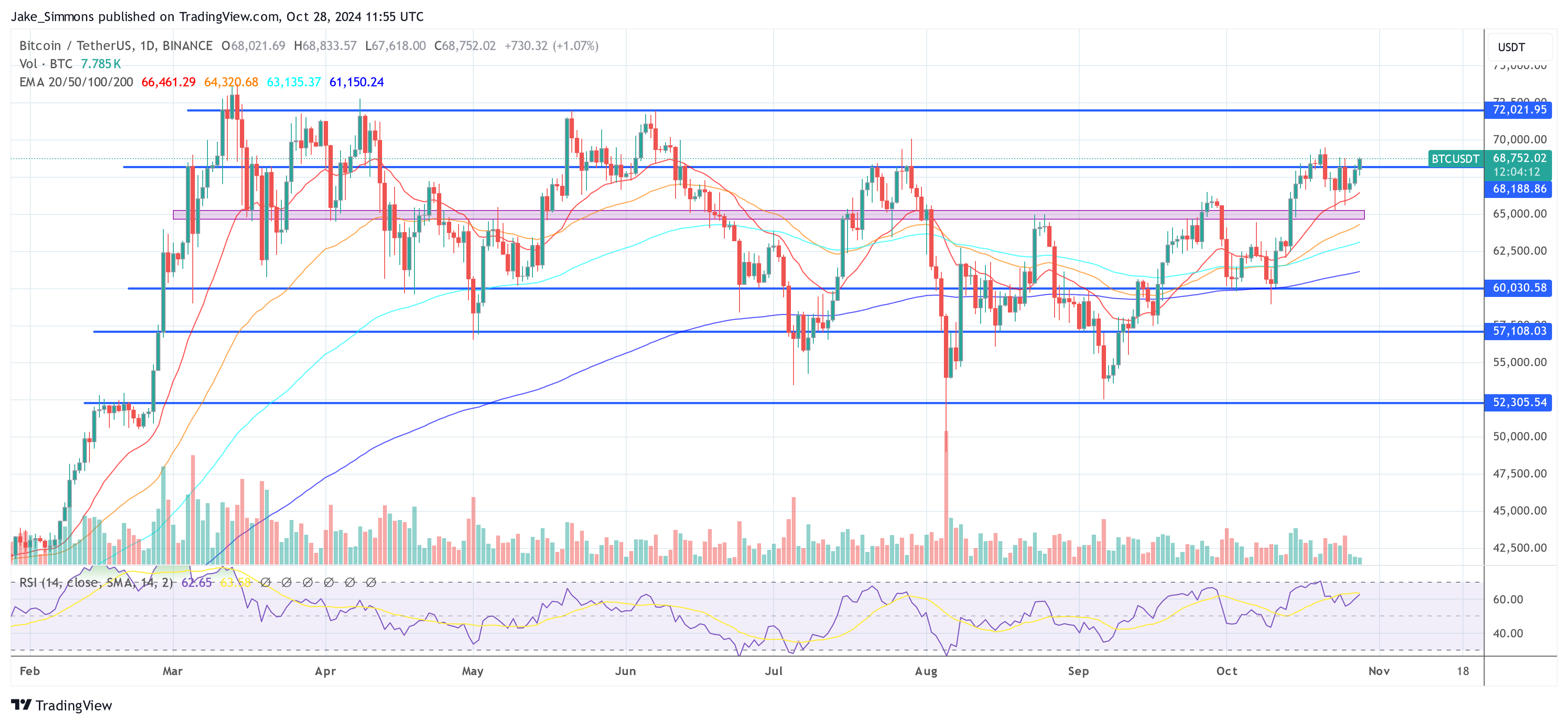In a brand new YouTube video titled “There Is No ETF Paper Bitcoin,” Fred Krueger, an investor on the crypto hedge fund 2718.fund, delved into the rising issues surrounding US spot Bitcoin Alternate-Traded Funds (ETFs) and their impression on the cryptocurrency’s value. Krueger aimed to dispel the worry, uncertainty, and doubt (FUD) which were circulating about “paper Bitcoin”—the notion that ETFs is perhaps promoting Bitcoin they don’t truly possess—and to clarify why Bitcoin’s value has not surged as dramatically as some may anticipate, regardless of important ETF purchases.
Krueger started his evaluation by acknowledging the prevalent skepticism available in the market. “There’s all this paper Bitcoin, and ETFs don’t actually have the Bitcoin, and in the event that they have been shopping for all this Bitcoin, how come Bitcoin value isn’t larger?” he said, encapsulating the core issues of many buyers.
Traditionally, the idea of “paper Bitcoin” has been related to exchanges that offered Bitcoin to prospects with out truly possessing the underlying belongings. Krueger highlighted a number of high-profile situations the place this follow led to important losses for buyers. He cited the case of Mt. Gox.
One other instance he supplied was QuadrigaCX, a Canadian change that collapsed below mysterious circumstances. Founder Gerald Cotten allegedly died in India, taking with him the personal keys to the change’s chilly wallets, successfully locking away buyer funds. “Loads of Canadians misplaced all their Bitcoin on this Quad change,” Krueger famous.
Are “ETF Paper Bitcoin” Actual?
These historic occasions have contributed to the present apprehension about ETFs and the chance that they is perhaps participating in comparable practices—promoting Bitcoin they don’t truly maintain, thereby suppressing BTC’s value by way of synthetic provide. Nevertheless, Krueger argued that ETFs, significantly these managed by established monetary establishments, function below a basically completely different framework in comparison with unregulated exchanges.
Associated Studying
Specializing in two main ETFs—IBIT, the BlackRock ETF, and FBTC, the Constancy ETF—Krueger emphasised the stringent regulatory oversight governing these entities. “Each of those ETFs are topic to very strict regulatory oversight, together with the SEC but additionally different businesses within the US,” he said. This complete oversight consists of necessities for full transparency, common audits, and using third-party custodians for asset verification. “They actually should get a receipt of an asset from a third-party custodian,” Krueger added.
Within the case of IBIT, Coinbase serves because the third-party custodian. “Coinbase is itself a public firm that’s audited,” Krueger identified, noting that the general public nature of Coinbase provides an extra layer of scrutiny and accountability. IBIT conducts audits of Coinbase, and each entities are topic to audits by the SEC and different regulatory our bodies. For FBTC, custody is dealt with by Constancy Digital Belongings, a separate entity inside Constancy that focuses on the custody of digital belongings, thereby guaranteeing specialised oversight and administration.
“The issuers of IBIT and FBTC are BlackRock and Constancy, two of the biggest and oldest monetary establishments, and so they have a vested curiosity in sustaining their status,” Krueger asserted. “Their status is at stake, and it is a huge deal,” he emphasised, suggesting that these establishments wouldn’t threat their credibility by participating within the sale of non-existent Bitcoin.
Krueger contrasted BlackRock with entities like QuadrigaCX to underscore the disparity in regulatory compliance and operational scale. “BlackRock is extremely regulated […] BlackRock has a strong company governance construction with committees for audit, threat, and compliance and really intensive inner controls,” Krueger added.
Associated Studying
Addressing the core concern about ETFs holding “paper Bitcoin,” Krueger supplied particular information to refute this notion. “The fact is the ETFs have zero pure paper Bitcoin,” he said unequivocally. He highlighted that IBIT holds roughly 403,000 precise Bitcoins, whereas FBTC holds about 185,000 precise Bitcoins. “Collectively, these two ETFs maintain nearly 3% of the world’s whole Bitcoin, or 588,000 Bitcoins—I feel it’s 2.9%,” he calculated.
Krueger acknowledged that some skeptics have tried to investigate Bitcoin motion between particular dates to problem these holdings. Nevertheless, he emphasised that the information are clear and verifiable. “We all know how a lot Bitcoin these ETFs have; we all know that it’s accounted for, and that’s a actuality,” he insisted.
Turning to the query of why Bitcoin’s value has not elevated extra dramatically regardless of important ETF inflows, Krueger provided a nuanced clarification. He famous that Bitcoin is, in reality, up by 60% because the introduction of the ETFs, translating to a $600 billion improve in market capitalization. This development has been fueled by roughly $20 billion in internet inflows into the ETFs, leading to a value multiplier impact of about 30x. “That’s traditionally about regular, perhaps a little bit on the low aspect however not terribly so,” he assessed.
Krueger attributed the moderation in Bitcoin’s value development to substantial promoting pressures from numerous sources. “There’s been a bunch of promoting,” he defined. He detailed that Germany offered $3 billion value of Bitcoin in addition to Mt. Gox holdings. Moreover, FTX offered its GBTC (Grayscale Bitcoin Belief) stake earlier within the yr, and the Digital Forex Group (DCG) offered belongings to resolve lawsuits. “We had lots of promoting,” Krueger summarized.
Speculating on the potential impression absent these promoting pressures, Krueger instructed that Bitcoin’s value might have been considerably larger. “We most likely could be at $90k if there wasn’t any promoting,” he posited.
At press time, BTC traded at $68,752.

Featured picture created with DALL.E, chart from TradingView.com

